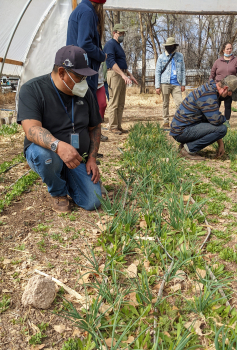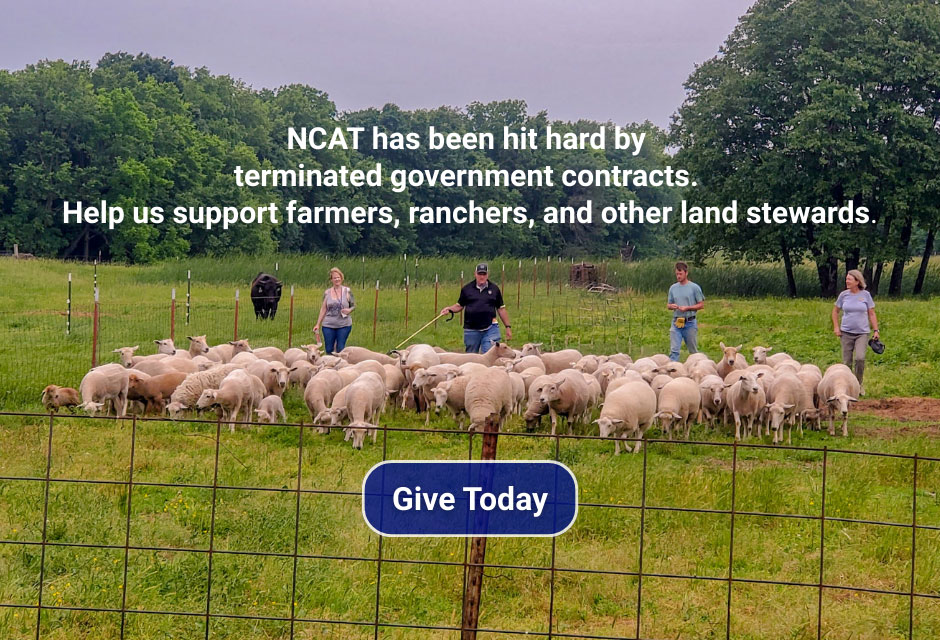By Mike Lewis, NCAT Senior Manager and Farmer Veteran
It was quiet when it happened. Not the kind of quiet that feels empty, but the kind that wraps around you like the stillness before a summer storm. A couple of weeks ago, my coworker Eric and I spent a day wandering through Armstrong Redwoods State Natural Reserve in Sonoma, California. We had come to the region for a year-end celebration hosted by Ranchin’ Vets, one of our Armed to Farm partners. But that day, we were just two friends walking through a forest of giants.
We didn’t expect to hear the groaning, cracking, and deep roar that followed. A thousand-year-old redwood—one of the elders of that forest—began to fall. We stood still, breath caught, as the ancient tree surrendered to gravity and centuries of standing strong. It collapsed with a thunder that rolled through the valley like the voice of God.
There was no panic in the moment. Just awe. Sadness, yes, and something like reverence. It felt like watching a great soul leave the earth—but also like being let in on a secret. A rare, sacred kind of transformation. We hadn’t come to witness anything that monumental, but sometimes the earth has its own plans.
As we approached the fallen redwood, we were struck not just by its size, but by its presence. Even fallen, it was not diminished. The tree, we knew, was not done with its work. Its life had changed form, not ended. Now it would become a home to insects and birds. It would hold moisture, enrich soil, and slowly feed the roots of new growth. Its service to the forest would continue—just in quieter, slower, more hidden ways.
That moment lingered with us, especially considering the work that had brought us there. Veterans—the ones we train, work alongside, and learn from—often come home changed. Some carry the visible scars of their service; others bear the invisible ones. But many of them return not to rest, but to serve again—this time by growing food, stewarding land, and nurturing the very communities they once left to protect.
Like the redwood, their fall from battle does not mark the end of their story. In fact, it begins a new chapter of service. One rooted not in combat, but in care. Not in defense, but in cultivation.
 The redwood fell exactly where it had stood for over a thousand years—a reminder that there’s something sacred about place. That tree will now nurture the forest that once nurtured it. And that, too, is the story of many veterans who return to their communities, not only to heal themselves, but to heal the land and people around them.
The redwood fell exactly where it had stood for over a thousand years—a reminder that there’s something sacred about place. That tree will now nurture the forest that once nurtured it. And that, too, is the story of many veterans who return to their communities, not only to heal themselves, but to heal the land and people around them.
In our trainings, we see this time and again: veterans reconnecting with the soil, finding meaning in seeds, livestock, rain, and hard work. Farming offers more than a livelihood. It offers a sense of rootedness, of coming home in a deeper way. It’s not about escaping from the past but building the future—allowing one’s story to take new shape in familiar ground.
The land doesn’t ask veterans to forget who they were. It invites them to become fully who they are now.
As we looked around the grove, we noticed something else: no part of the tree would go to waste. The forest already knows how to receive it. Birds will perch on its limbs. Mushrooms will take root in its bark. Young trees will sprout in the softened soil beneath it.
The forest never loses its own.
That truth echoes in the way we view veterans in our work. Too often, society treats their transition as an ending—a closing of one chapter with no roadmap for what comes next. But in agrarian life, we see something different. We see a forest that welcomes them back. We see communities strengthened by their presence. We see the way they feed the ecosystem with their skills, their values, and their willingness to serve again—this time as cultivators of resilience, local knowledge, and hope.
We like to imagine that life has chapters: childhood, youth, service, retirement. But that’s not how nature works. The redwood doesn’t retire. It simply moves from one mode of giving to another. The ecosystem doesn’t discard what falls; it transforms it into the conditions for life.
Service isn’t a season. It’s a cycle.
 Veterans know this in their bones. They understand commitment, discipline, purpose—and many of them are now discovering how those same values apply not just in battle, but in fields, kitchens, farmers markets, and classrooms. They are becoming food producers, educators, mentors, and neighbors. They are learning to grow instead of defend—to restore rather than react. And in doing so, they help restore the places they love.
Veterans know this in their bones. They understand commitment, discipline, purpose—and many of them are now discovering how those same values apply not just in battle, but in fields, kitchens, farmers markets, and classrooms. They are becoming food producers, educators, mentors, and neighbors. They are learning to grow instead of defend—to restore rather than react. And in doing so, they help restore the places they love.
Back in the forest, after the fall, the birds kept singing. Sunlight filtered down to the understory in a new way. And Eric and I stood there, not in grief, but in gratitude. We had witnessed something ancient and holy—a reminder that even the mightiest among us are still part of a much larger cycle.
Maybe that’s what the redwood was trying to show us: that when we root ourselves in service to others and to the land, we never really stop growing. Even when we fall, we fall into the arms of something that knows exactly what to do with us.
The forest never forgets.
The land never wastes.
And the work of service—real service—never ends.

 “It was cool to see and hear stories about how farmers started similar to where I’m at right now and how they learned to use grants, have the drive, and make it a business,” he says. “I loved the training; it was amazing.”
“It was cool to see and hear stories about how farmers started similar to where I’m at right now and how they learned to use grants, have the drive, and make it a business,” he says. “I loved the training; it was amazing.” 